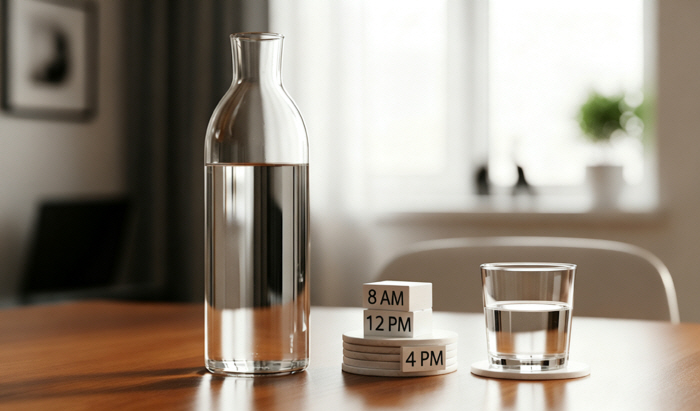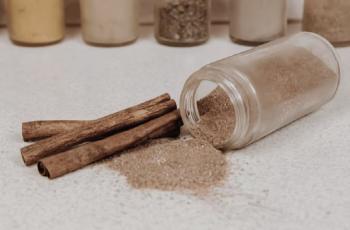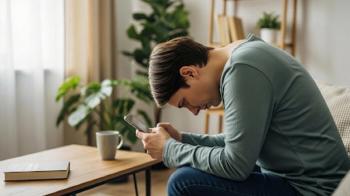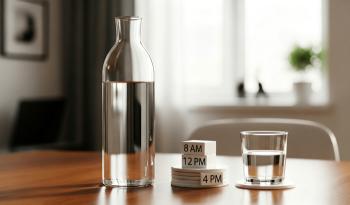Water intake per day. It's effective if you share it like this
Sep 23, 2025
|
We are often told to drink 1.5 to 2 liters of water a day. However, simply drinking a lot does not help your health. If you drink it all at once, it may put a strain on your kidneys and cause swelling. Therefore, water intake is key to 'timing and distribution' rather than 'Yang'. From just after waking up in the morning to before going to bed, you have to share it little by little according to the rhythm of your body to see a real effect. From now on, let's look at the most efficient way to share your daily water intake.
1. Immediately after waking up in the morning? A glass of lukewarm water on an empty stomach
The water you drink as soon as you wake up from a lack of water overnight helps blood circulation and wakes the body up. In particular, lukewarm water gently stimulates the intestine, which is effective for morning bowel movements. If you drop a few drops of lemon here, you can expect to boost your metabolism. It's more important to start the day with a drink of water than coffee or tea.
2. Before and after breakfast? Drinking water to help digestion
Rather than drinking a lot of water before breakfast, it is better to moisturize your mouth with a sip or two. Excessive water intake immediately after eating should be avoided as it can cause a burden by diluting digestive enzymes. Instead, drinking a glass of lukewarm water 30 minutes after a meal helps digestion and facilitates metabolism.
3. During morning activities? Hydration to improve concentration
During morning work or study hours, the brain consumes a lot of moisture, which can lead to poor concentration. At this time, it is ideal to drink about half a cup every hour, little by little. Frequent drinking of water can help prevent fatigue and reduce headaches and dizziness.
4. Before and after lunch? Overeating prevention and digestion balance
A cup of water before lunch plays a big role in preventing overeating. Hunger and thirst are often confused, so drinking water before meals can control the amount of meals. After lunch, it is recommended to drink one or two cups of warm water after about 30 minutes. This reduces the burden on the stomach and facilitates the digestion process.
5. Afternoon? Recovery from fatigue and prevention of swelling
In the afternoon, it is a time when the body's energy drops and drowsiness comes. At this time, drinking water instead of caffeine drinks can restore concentration. In particular, office workers who sit for a long time should get up from their seats every hour, stretch lightly, and take a sip or two of water. It is effective in improving blood circulation and preventing lower body swelling.
6. Before and after exercise? Regulating body temperature and replenishing moisture
Before exercising, you should drink one or two glasses of water in advance to stabilize your body temperature and prevent dehydration. It is recommended not to drink a large amount at once in the middle of exercise, and to replenish one or two sips every 15 to 20 minutes. After exercising, replenish enough moisture that has escaped from sweating, but it is the healthiest to consume water instead of ion drinks.
7. Dinner? Drink water to relax your body
After dinner, it is time to check the moisture that has been lacking for a day. Drinking warm water or herbal tea relieves tension and helps digestion. However, excessive water intake can lead to swelling or obstruction of good sleep overnight, so you should control it properly in the evening.
8. Before going to bed? Water management that doesn't interfere with a good night's sleep
Drinking a lot of water just before you go to sleep can break your sleep due to night urination. Therefore, it is appropriate to reduce water intake one to two hours before going to sleep, and to drink a sip or two only if your mouth is dry. However, for patients with high blood pressure or diabetes, it is recommended to adjust the water intake time according to the recommendation of the specialist.
Drinking enough water is fundamental to health, but 'when and how you drink it' is just as important. A glass of water on an empty stomach in the morning, a balanced intake before and after meals, a habit of drinking frequently during activities, and a supplement before and after exercise can be effective. Just by inadvertently changing the habit of drinking a lot at once, you can enjoy various health effects such as preventing swelling, improving digestion, and improving concentration. From today on, let's think of water not just as quenching our thirst, but as a 'part of our daily routine'. Small changes in habits will make your body healthier and more energetic.
This article was translated by Naver AI translator.














